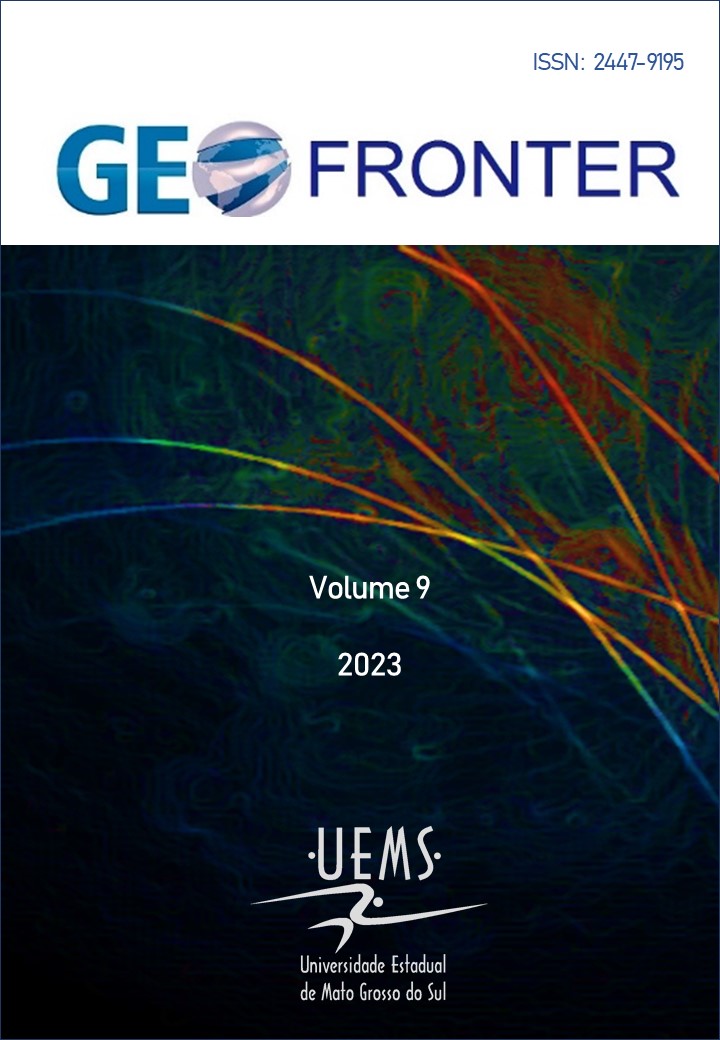EDUCAÇÃO AMBIENTAL E MULHERES: UM DIÁLOGO DECOLONIAL NECESSÁRIO E POSSÍVEL
DOI:
https://doi.org/10.61389/geofronter.v9i1.7614Keywords:
AmbienteAbstract
The environmental crisis that takes shape in the current scenario alerts us to various groups in society that are harmed directly or indirectly by the degradation of the environment. Every living being can feel the destruction of the environment, however, the purpose of this work is aimed at a specific group: women. Thus, it is important to problematize the narratives built over time, around women and environmental education, supported by the decolonial concept. From this perspective, we seek to present some reflections on the themes and dialogue between authors who address women, decoloniality and their relationships in the field of environmental education, aiming at a sustainable, fair and egalitarian society. In this sense, the path taken in
this article begins with discussions about environmental education and possible approaches to the other proposed themes, then reflections on the history of women were brought, understanding that environmental education has an important role to ponder actions that permeate different social groups and, with that, allowing the proposition of ways for a sustainable society. Finally, the approach revolves around decoloniality based on matrinarratives. And to finalize the reflections of the article, the combination of the three themes, since environmental education for sustainability has the premise of being inclusive.
References
ADICHIE, Chimamanda Ngozie. O Perigo de uma História Única. Disponível em: https://www.ted.com/talks/chimamanda_ngozi_adichie_the_danger_of_a_single_story?language=pt-br#t-2688. Acessada em 25 de maio de 2023.
ARROYO, Miguel G. Outros sujeitos, outras pedagogias. Petrópolis, RJ: Vozes, 2014.
BIROLI, Flávia, Luis Felipe MIGUEL (organizadores). Teoria política feminista: textos centrais. Vinhedo: Editora Horizonte, 2013.
COLLING, Ana Maria. Tempos diferentes discursos iguais: a construção do corpo feminino na história/ Dourados, MS: UFGD, 2014. DOI: https://doi.org/10.14393/CEF-v28n2a2015-9
DE OLIVEIRA CARVALHO, Lízia. Sentidos de Florescer: feminismos e decolonialidade na comunicação de mulheres Aymara. Dissertação apresentada ao Programa de Pós-Graduação Interdisciplinar em Direitos Humanos da Universidade Federal de Goiás — PPGIDH/UFG, como requisito parcial para obtenção do título de Mestra em Direitos Humanos. 2018.
DIAS, Luciana de Oliveira, SOUZA, Cristiane Santos e HENNING, Carlos Eduardo. Orí e cabaça são femininas: mulheres-raízes e suas insurgências na intelectualidade brasileira. Revista Humanidades e Inovação, v. 7, nº. 25, 2020.
FEDERICI, Silvia. Calibã e a bruxa: mulheres, corpo e acumulação primitiva. Tradução: Coletivo Sycorax. São Paulo: Elefante, 2017.
FREIRE, Paulo. Pedagogia do Oprimido. Ed. Paz e Terra. 44º Edição. 1969.
FELIPE, Jane; GUIZZO, Bianca Salazar. Entre batons, esmaltes e fantasias. In. LOURO, Guacira Lopes. Gênero, Sexualidade e Educação: uma perspectiva pós-estruturalista. Petrópolis: Editora Vozes, 1997.
LAMIM-GUEDES, Valdir.; INOCÊNCIO, Adalberto Fernando. Mulheres e Sustentabilidade: uma aproximação entre movimento feminista e a educação ambiental. Educação Ambiental em Ação. Volume XII, Número 45, 2018. Disponível em: http://www.revistaea.org/artigo.php?idartigo=1559. Acessado em: 27 de maio de 2023.
LOUREIRO, C.B.F. O que significa transformar em Educação Ambiental. In: Zakrzevski, S.B.; Barcelos, V. (Orgs.) Educação Ambiental e compromisso social. Erechim: EdiFapes. 2004
LEFF, Enrique. Saber Ambiental: sustentabilidade, racionalidade, complexidade, poder/Enrique Leff: tradução de Lúcia Mathilde Endlich Orth. 8.ed. - Petrópolis, RJ: Vozes, 2011
LUGONES, María. Rumo a um feminismo decolonial. Revista de estudos feministas, v. 22, n. 3, p. 929-934, 2014. DOI: https://doi.org/10.1590/S0104-026X2014000300012
MIGNOLO, Walter D. Colonialidade: o lado mais obscuro da modernidade. Revista brasileira de ciências sociais - Vol, 32 nº 94. Tradução de Marco Oliveira, 2017. DOI: https://doi.org/10.17666/329402/2017
OLIVEIRA, Luiz Fernandes de; CANDAU, Vera Maria Ferrão. Pedagogia decolonial e educação antirracista e intercultural no Brasil. Educação em Revista, Belo Horizonte, v. 26,n. 1, p. 15-40, abr. 2010. DOI: https://doi.org/10.1590/S0102-46982010000100002
ORGANIZAÇÃO DAS NAÇÕES UNIDAS MUJERES- ONU MUJERES. Familias em um mundo cambiante: El progresso de las mujeres en el mundo 2019-2020. Nova Iorque: ONU MUJERES, 2019.
QUIJANO, Anibal. Colonialidade do poder, eurocentrismo e América Latina. In: LANDER, Edgardo (Org.). A colonialidade do saber: eurocentrismo e ciências sociais. Perspectivas latino-americanas. Buenos Aires: CLACSO, Consejo Latinoamericano de Ciencias Sociales, setembro de 2005. p.107-126.
REZENDE, Tânia. NARRATIVAS DO CERRADO: AS VOZES DAS MATAS PARA UMA EDUCAÇÃO LINGUÍSTICA ANTIRRACISTA. Lingu@ Nostr@ - Revista Virtual de Estudos de Gramática e Linguística. ISSN 2317-2320. Vitória da Conquista, v. 8, n. 1, p. 38. Disponível em: https://www.ted.com/talks/chimamanda_ngozi_adichie_the_danger_of_a_single_story?language=pt-br#t-2688. Acessada em 25 de maio de 2023. DOI: https://doi.org/10.29327/232521.8.1-4
SARDENBERG, Cecília Maria Bacilar. DA CRÍTICA FEMINISTA À CIÊNCIA A UMA CIÊNCIA FEMINISTA? Intervenção feita à Mesa “Crítica Epistemológica Feminista” no X Encontro da REDOR (NEIM/UFBA). Salvador, 29 de outubro a 1 de novembro de 2001.
TEDESCHI, Losandro Antonio. As mulheres e a história: uma introdução teórica metodológica. Dourados, MS: Ed. UFGD, 2012.
TORREÃO, N.. A liderança feminina no desenvolvimento sustentável. Revista Ártemis, n.7, v.7, p.101-121, 2007.
TRISTÃO, Martha. Tecendo os fios da educação ambiental: o subjetivo e o coletivo, o pensado e o vivido. Revista: Educação e Pesquisa, São Paulo, v. 31, n. 2, p. 251-264, maio/ago. 2005. DOI: https://doi.org/10.1590/S1517-97022005000200008
VERGÈS, Françoise. Um feminismo decolonial. Tradução de Jamille Pinheiro Dias e de Raquel Camargo. São Paulo: Editora Ubu, 2020.
Downloads
Published
How to Cite
Issue
Section
License

This work is licensed under a Creative Commons Attribution-NonCommercial-NoDerivatives 4.0 International License.
Os autores concedem à revista GEFRONTER os direitos autorais sobre o texto aceito para publicação. Autorizações especiais podem ser concedidas mediante aceite do editor do periódico.

